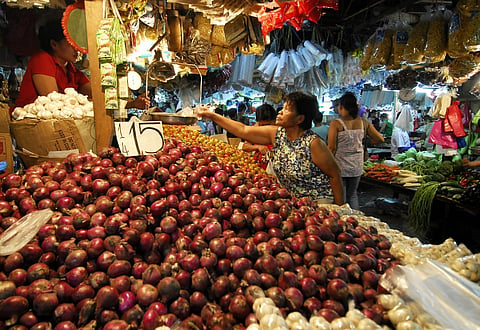
- NEWS
- the EDIT
- COMMENTARY
- BUSINESS
- LIFE
- SHOW
- ACTION
- GLOBAL GOALS
- SNAPS
- DYARYO TIRADA
- MORE

The House of Representatives has vowed to mobilize efforts to lower the prices of rice and onions in light of the recent reports that the commodities are subject anew to hoarding and price manipulation.
Driven by a high satisfaction rating from a recent poll, House Speaker Martin Romualdez said on Sunday that "the House would remain focused on stabilizing the prices of rice, onions, and other staples" to assist Filipinos, particularly retailers, small traders, and market stallholders, who were at receiving ends of the soaring prices of the said commodities.
"Needless to say, if there is enough supply, we would not be having problems with prices," Romualez said.
Previously, President Ferdinand Marcos Jr. imposed a rice price ceiling via Executive Order 39, which sets the price of regularly milled rice to P41 while P45 for well-milled rice.
The price cap took effect on 5 September.
Marcos imposed the directive to ensure a reasonable price of rice amid the current surge in its retail prices in the Philippines, "which resulted in a considerable economic strain on Filipinos, particularly the underprivileged and marginalized."
Quezon Rep. Mark Enverga, chairperson of the House committee on agriculture and food, said the President's move of imposing a price cap on rice, complemented by a series of warehouse inspections on suspected rice hoarders by authorities along with members of the House has contributed to the stabilization of rice despite uncertainties prevailing in the global market.
Albay Rep. Joey Salceda, an economist and chairman of the House committee on ways and means, meanwhile, believes that the EO 39 ended the price spike of the staple grain in the Philippine market.
"It is now clear that soaring cost of the grain is artificial, driven by market speculation and rice traders driven by greed. Now, we have to manage our rice inventory better to avoid fueling the speculation here and in the global rice market," Salceda stressed.
According to Salceda, Marcos' intervention and Congress' assistance are a "testament to their ability" to navigate complex economic terrains as the global market shifted following the imposition of EO 39.
"It highlights the Philippines' capacity to influence and contribute positively to international food markets," Salceda pointed out.
The Department of Agriculture, headed by Marcos himself, earlier denied reports of a rice shortage in the country even as the price of the staple grain ranged from P42 to P60 per kilo, way higher than the government's "aspiration" of P20 per kilo.
In light of the woes linked to the staple grain, Agri Partylist Rep. Wilbert Lee filed House Bill 9020, or the proposed "Cheaper Rice Act," to help alleviate the financial strain on consumers while making rice production profitable for 2.6 million rice farmers through a subsidy program.
Under the bill, the DA, in coordination with the Department of Trade and Industry and other relevant government agencies, will establish a subsidy program to incentivize rice farmers to augment their production by enabling them to sell palay at a higher price.
